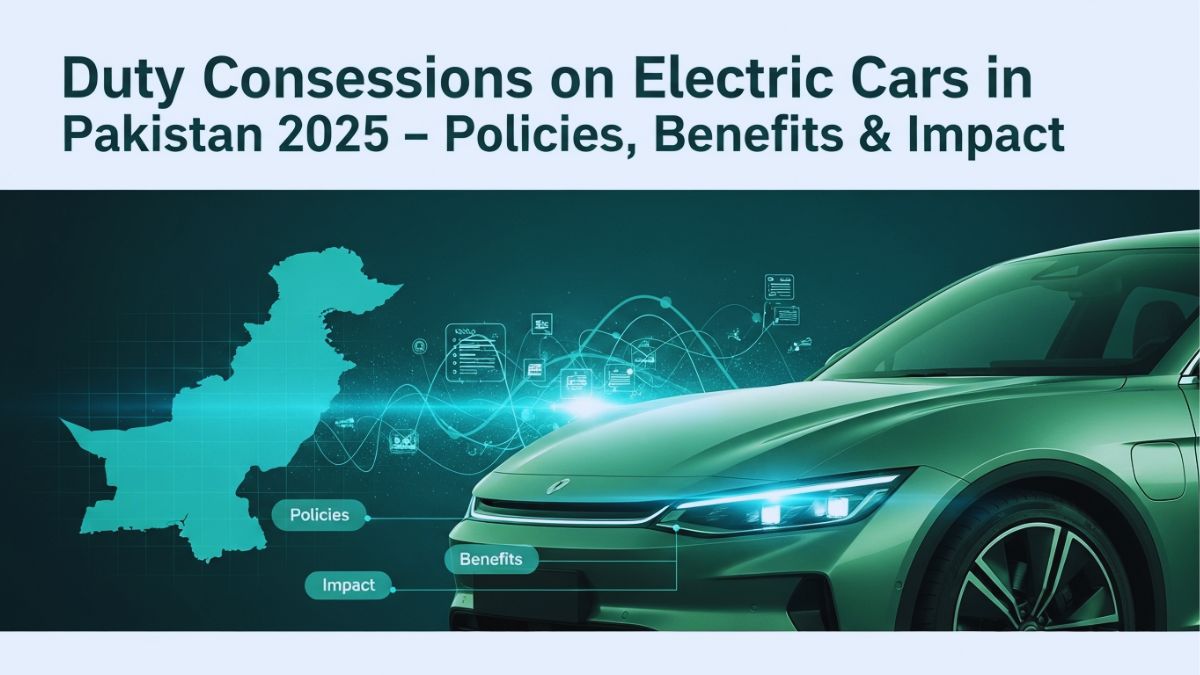The shift towards electric mobility in Pakistan is accelerating, and 2025 marks an important year for new tax concessions, duty relaxations, and supportive policies. The government is actively encouraging the adoption of electric vehicles (EVs) by lowering costs for buyers while making internal combustion engine (ICE) cars less attractive.
Latest Duty and Tax Concessions in 2025
New Energy Vehicles Adoption Levy
To discourage petrol and diesel cars, Pakistan introduced the New Energy Vehicles Adoption Levy (2025):
- ICE Cars, SUVs, Buses, and Trucks:
- Up to 1300cc: 1% levy
- 1300cc – 1800cc: 2% levy
- Above 1800cc: 3% levy
- Exemption: EVs, plug-in hybrids with 50 km+ electric range, and fuel-cell vehicles.
This makes electric cars more competitive compared to petrol and diesel vehicles.
Sales Tax (GST) Structure
- Electric Cars (EVs): Currently taxed at 18% GST.
- Hybrid Electric Vehicles (HEVs ≤1800cc): Fixed at 12.5% GST after the 2025 budget revision.
- Large HEVs (>1800cc): Subject to higher GST.
Although hybrids appear cheaper at purchase, EVs benefit from lower running costs in the long term.
Most Durable Cars for Rural Pakistan 2025 – Reliable, Affordable & Long-Lasting Options
READ MORE
Customs Duty on EV Parts
- CKD EV Parts: Concessionary customs duty as low as 1% for local assembly.
- CBU EV Imports: Standard duty rates apply depending on HS code.
- Impact: Encourages local production and reduces EV assembly costs in Pakistan.
Federal Excise Duty (FED)
- EVs remain exempt from FED, lowering the overall cost of ownership compared to conventional vehicles.
Charging Cost Advantage
- Public EV Charging Tariff (2025):
- Base tariff: PKR 23.57/kWh
- Effective post-tax cost: ~PKR 39.70/kWh
- Comparison: Significantly cheaper than petrol, which costs around PKR 280–300/litre.
- Result: EVs offer major fuel cost savings, especially for fleet operators, ride-hailing drivers, and frequent commuters.
Pakistan’s EV Policy 2025–2030
The government launched a new five-year EV policy with a strong focus on electrifying two and three-wheelers but indirectly supporting car buyers.
- Subsidy Allocation: Over PKR 100 billion for e-bikes and e-rickshaws.
- Special Quota: Women riders included in subsidy benefits.
- Target: Save $1 billion annually on fuel imports and reduce emissions.
- Impact on Cars: Faster expansion of charging networks and stronger push for local EV assembly.
Tax Snapshot for 2025
| Vehicle Type | GST | FED | Levy | Customs Duty |
|---|---|---|---|---|
| Fully Electric Cars | 18% | 0% | Exempt | CKD: 1% parts / CBU: standard |
| Hybrid EV ≤1800cc | 12.5% | Standard | Exempt | Standard duties |
| Hybrid EV >1800cc | Higher GST | Standard | Exempt | Standard duties |
| ICE Vehicles | 18% | Standard | 1–3% levy | Standard duties |
Car Loan Documentation in Pakistan 2025 – Complete Guide to Requirements & Process
READ MORE
Market Impact in 2025
- ICE Cars: More expensive due to levy, losing cost advantage.
- Hybrids: Still popular due to reduced GST (12.5% on ≤1800cc).
- EVs: Exempt from levy and FED, supported by low charging costs and duty concessions.
- Consumer Trend: Growing adoption of EVs in fleets and among urban buyers seeking long-term savings.
Conclusion
Pakistan’s 2025 duty concessions on electric cars highlight a strong policy direction towards cleaner, sustainable mobility. While small hybrids retain a tax advantage at purchase, EVs offer clear long-term benefits through zero levy, zero FED, reduced charging tariffs, and lower maintenance costs.
The government’s commitment to building charging infrastructure and supporting local assembly will gradually improve affordability, making electric cars a practical and future-ready choice for Pakistani buyers.









